
On the night of January 8, Sri Lankan soldiers and police entered Jaffna University and demolished a monument, erected in 2019, to mark the massacre of Tamils at Mullivaikkal in 2009.
This particular massacre took place during the final weeks of the civil war.
Hundreds of thousands of Tamil civilians who fled the advancing Sri Lankan army finished up at Mullivaikkal on the north-east coast Sri Lanka. They were bombarded from land, sea and air, resulting in the deaths of tens of thousands of people.
The Sri Lankan government has consistently tried to suppress any attempt to commemorate those who died at the hands of its forces. It has demolished cemeteries where Tamil fighters were buried. It has banned commemorative events.
The monument at Jaffna University, in the predominantly Tamil north of the island, was built to mark the tenth anniversary of the Mullivaikkal massacre.
When the people of Jaffna heard about its demolition many rushed to the university but were blocked by the army and police from entering. Students began a hunger strike. On January 11, businesses shut down across the north and east of the island.
After the university vice-chancellor agreed to rebuild the monument in the same place, subject to approval from authorities, the students called off their hunger strike.
The Australian Tamil Congress has called on the Australian government to condemn the destruction of the Jaffna University monument and similar acts.
The Tamil Refugee Council (TRC) has called on the Australian government to “recognise the ongoing persecution of Tamils in Sri Lanka and end its practice of deporting Tamil asylum seekers, including Priya and Nades from Biloela [in Queensland]”.
The TRC has called on the federal government to “give permanent protection visas to all asylum seekers from Sri Lanka”.